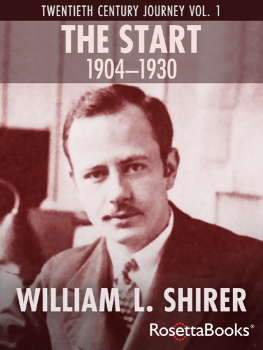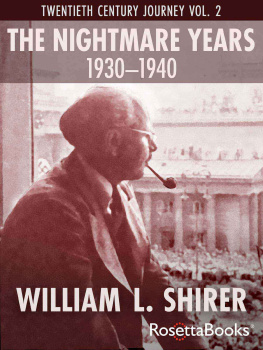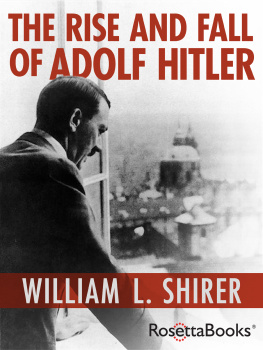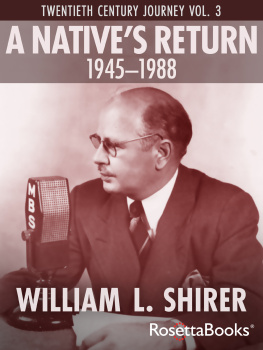THE LONG NIGHT
A LSO BY S TEVE W ICK
Bad Company: Drugs, Hollywood and the Cotton Club Murder
Heaven and Earth: The Last Farmers of the North Fork
THE LONG NIGHT
W ILLIAM L. S HIRER AND
T HE R ISE AND F ALL OF THE
T HIRD R EICH
STEVE WICK

The author and publisher have provided this e-book to you for your personal use only. You may not make this e-book publicly available in any way. Copyright infringement is against the law. If you believe the copy of this e-book you are reading infringes on the authors copyright, please notify the publisher at: us.macmillanusa.com/piracy.
THE LONG NIGHT
Copyright Steve Wick, 2011.
All rights reserved.
For information, address St. Martins Press, 175 Fifth Avenue, New York, N.Y. 10010.
First published in 2011 by
PALGRAVE MACMILLAN
in the United Statesa division of St. Martins Press LLC,
175 Fifth Avenue, New York, NY 10010.
ISBN 9780230623187
Photograph and text permissions are from Don Congdon Associates Inc., and the Literary Estate of William L. Shirer.
Our eBooks may be purchased in bulk for promotional, educational, or business use. Please contact the Macmillan Corporate and Premium Sales Department at 1-800-221-7945, ext. 5442, or by e-mail at .
Library of Congress Cataloging-in-Publication Data.
Wick, Steve.
The long night : William L. Shirer and the rise and fall of the Third Reich / by Steve Wick. p. cm.
Includes bibliographical references and index.
ISBN 978-0-230-62318-7 (hardback)
1. Shirer, William L. (William Lawrence), 19041993. 2. Journalists United StatesBiography. 3. World War, 19391945Journalists Biography. 4. World War, 19391945Press coverageUnited States. 5. FascismGermanyPress coverage. I. Title.
PN4874.S49W53 2011
070.4332092dc22
2011005262
[B]
A catalogue record of the book is available from the British Library.
Design by Newgen Imaging Systems (P) Ltd., Chennai, India.
First edition: August 2011
10 9 8 7 6 5 4 3 2 1
Printed in the United States of America.
In memory of Lt. Michael Murphy May 7, 1976June 28, 2005
We owe respect to the living. To the dead we owe only the truth.
Voltaire
The historians task is not to disrupt for the sake of it, but it is to tell what is almost always an uncomfortable story and explain why the discomfort is part of the truth we need to live well and live properly. A well-organized society is one in which we know the truth about ourselves collectively, not one in which we tell pleasant lies about ourselves.
Tony Judt
What can I say? At least you opposed evil. You werent corrupted. You and I and the many locked up here, and the many more in other places of detention, and tens of thousands in concentration campstheyre all resisting, today and tomorrow
Yes, and then they will kill us, and what good did our resistance do?
Well, it will have helped us to feel that we behaved decently till the end. And much more, it will have helped people everywhere, who will be saved for the righteous few among them, as it says in the Bible. Of course, Quangel, it would have been a hundred times better if wed had someone who could have told us. Such and such is what you have to do; our plan is this and this. But if there had been such a man in Germany, then Hitler would never have come to power in 1933. As it was, we all acted alone, we were caught alone, and every one of us will have to die alone. But that doesnt mean that we are alone, Quangel, or that our deaths will be in vain. Nothing in this world is done in vain, and since we are fighting for justice against brutality, we are bound to prevail in the end.
And what good will that do us, down in our graves?
Quangel, I ask you! Would you rather live for an unjust cause than die for a just one?
From the novel Every Man Dies Alone, by Hans Fallada, page 430
CONTENTS
TIMELINE OF EVENTS
| January 1933 | Adolf Hitler becomes chancellor of Germany. |
| February 1933 | The Reichstag burns. |
| June 1934 | The bloody purge ordered by Hitler known as Nacht der langen Messer (The Night of the Long Knives) leaves hundreds dead, including Ernst Rhm, head of the SA. |
| August 1934 | William L. Shirer and his wife Tess arrive in Berlin. Shirer goes to work for an American news wire service. |
| September 1935 | The German government approves passage of the Nuremberg Laws. These laws codified who was Jewish in the new Nazi state and deprived those defined as Jews of their German citizenship. |
| March 1936 | German troops sweep into the Rhineland, in violation of the terms of the Treaty of Versailles written in 1919, a year after the end of the Great War. |
| March 1938 | The Anschluss: Austria is brought into the German Reich. Hitler arrives victoriously in Vienna. |
| September 1938 | The Munich Accord is approved. It gives Germany the right to annex the Sudetenland, the German-speaking parts of Czechoslovakia. |
| November 1938 | Synagogues are set ablaze across Germany and Austria in an outburst of government sanctioned violence against Jews called Kristallnacht. |
| March 1939 | German troops invade Czechoslovakia and occupy the capital city of Prague. |
| August 1939 | Germany and the Soviet Union approve a treaty of non-aggression between the two countries. |
| September 1939 | German troops invade Poland. Great Britain and France declare war on Germany. |
| May 1940 | Sweeping west, German troops invade the Low Countries. The Netherlands and Belgium surrender. |
| June 1940 | The German army reaches Paris. France surrenders and signs an armistice with Germany in the same rail car in Compigne, France, where the Germans surrendered in 1918. |
| December 1940 | William L. Shirer leaves Berlin on a flight to Spain and then Portugal, where he boards a ship for the United States. |
PROLOGUE
L EAVING B ERLIN
Berlin, December 5, 1940
S now had fallen all night, and as morning broke over the metropolis, Bill Shirer set out in a taxi from the Adlon Hotel for the airport at Tempelhof. He felt as if hed been running nonstop for days or weeks or years. On top of the fatigue, hed had too many whiskeys the previous nights as he planned his getaway, and this morning his stomach churned. The alarm that had overcome him in previous weeks grew more intense as the cab negotiated the snowy streets.
The final mile to the airport stretched on and on until finally there it was, dark buildings set against an overcast sky. Each night Berlin became a vast city of dark streets and dark buildings trying desperately to hide itself from British bombers, but the morning sun revealed all its secrets. Shirer was sick of being in a blacked-out city, sick of the darkness and the fear and the inability to live any kind of happy life. He missed the bright nights listening to great music. He loathed the government censors and the officious bureaucrats and the journalists who played along with them. On top of everything, he missed his wife, Tess, and their two-year-old daughter, Eileen.
He had not expected the weather to turn so bad. It only heightened his worry. Three big passenger planes had crashed in previous days because of icing problems. If the storm worsened, the plane would not take off and the airport would be shut down. Hed have to try again another day, and every day brought unexpected risks. If the plane did take off in the storm, he feared that the wings would ice up and the pilot would have to drop lower over the mountains. Anything could happen then. His friend Wally Deuel, in a panic after the three crashes, had left Berlin the day before on a train to Stuttgart, where he hoped to find a safe flight out of the country.
Next page








